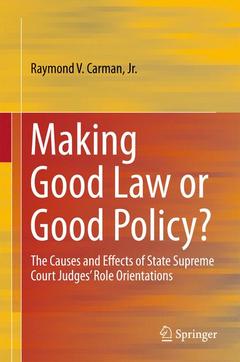Making Good Law or Good Policy?, 1st ed. 2017 The Causes and Effects of State Supreme Court Judges' Role Orientations
Auteur : Carman Raymond V.

1. An Empirical Puzzle.- 2. Role Theoretic Literature and a Judicial Role Theoretic Framework.- 3. Survey Design and Survey Results.- 4. Determining the Causes of Role Orientation.- 5. Role Orientation's Effect on Role Behavior.- 6. Conclusion.
Raymond V. Carman, Jr. is an Assistant Professor in the Department of Political Science at the State University of New York, College at Plattsburgh, where he has been a faculty member since 2014. Ray completed his Ph.D. at Binghamton University and his undergraduate studies at Niagara University. His research and teaching interests include: American political institutions (including courts, federalism, intergovernmental relations, and state politics); judicial behavior and politics (including judicial decision-making, judicial selection, and the psychology of judging); law (including civil rights and liberties, and constitutional law); and research methods.
Provides a theoretically-grounded and empirically-tested examination of the effect that judges' role orientations have on their decision-making
Analyzes the results of a nationwide survey of the entire population of state supreme court judges
Presents the first cross-institutional examination of the role orientations of state supreme court judges
Includes supplementary material: sn.pub/extras
Date de parution : 03-2017
Ouvrage de 140 p.
15.5x23.5 cm
Disponible chez l'éditeur (délai d'approvisionnement : 15 jours).
Prix indicatif 84,39 €
Ajouter au panierDate de parution : 07-2018
Ouvrage de 140 p.
15.5x23.5 cm
Disponible chez l'éditeur (délai d'approvisionnement : 15 jours).
Prix indicatif 84,39 €
Ajouter au panier


